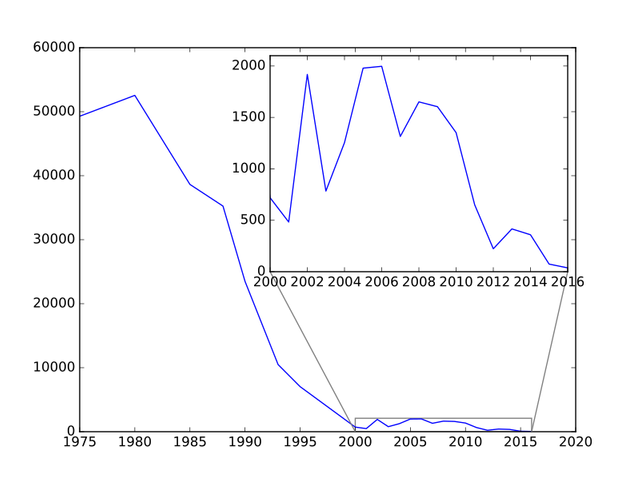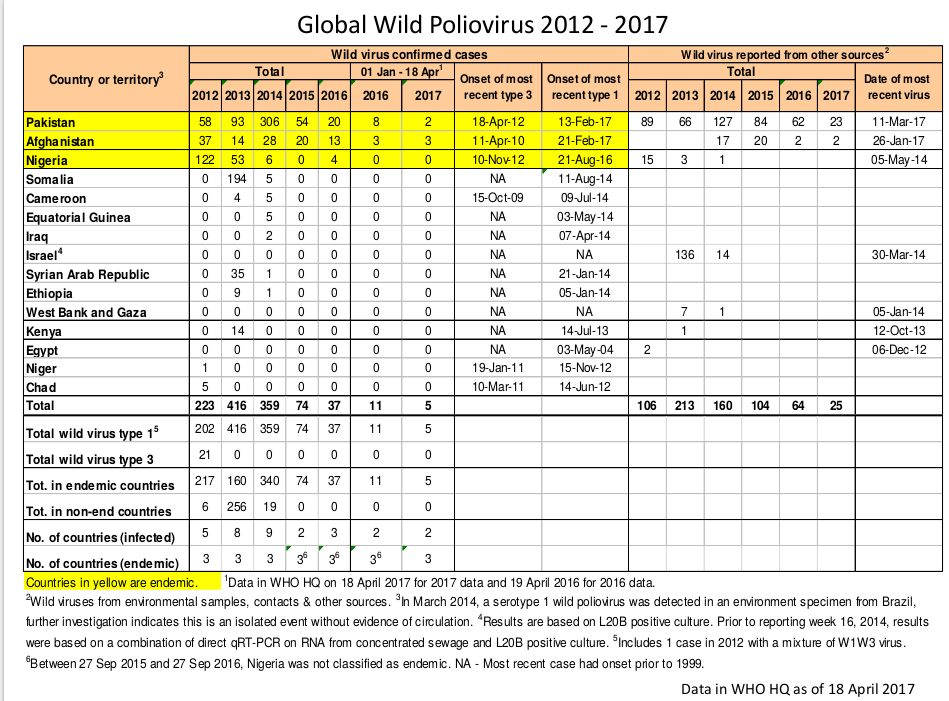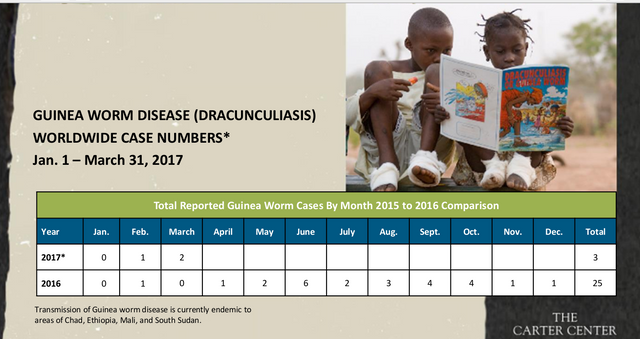Eradicating infectious diseases
Eradicating infectious diseases has been a distant dream for millennia. For thousands of years it seemed impossible to even attempt to eradicate a disease as we were simply lacking the insight and understanding of the underlying mechanisms with regards to how our body deals with diseases.
However, due to breathtaking advances in science and medicine, humans were able to finally eradicate the dangerous disease smallpox in 1980 after vaccination campaigns throughout the 19th and 20th centuries. Rahima Banu from Bangladesh is the last known person to have been infected with naturally occurring Variola major smallpox. To this day, smallpox is still the only infectious disease (of humans) that has ever been wiped off the face of the earth.
The eradication of smallpox was a huge victory, but there are still many battles to be fought. For example, the battle of eradicating polio. Just have a look at the following graph in order to get an understanding of how far we have actually already come with this fight.

"Number of poliovirus cases by year, 1975–2016", Source: https://en.wikipedia.org/
That's a reduction of more than 99.9 % of all polio cases if we compare the number of cases in 1975 (50,000) with the number of cases in 2016 (42). In the year 2017 we are very, very, close to eradicate polio once and for all as the following table shows:

Unfortunately, it turns out that eradicating polio completely is a very complex task due to a large variety of reasons. The EndPolio campaign and the Global Polio Eradication Initiative provide more information about the history and current state of this massive global effort.
Another infectious disease on the brink of eradication is Dracunculiasis. The cause of this disease is an infection by the Guinea worm. It would be a huge victory to eradicate this painful disease (or its cause) once and for all. Currently, the outlook is quite good as we managed to reduce the number of global cases to 25 (!) in 2016. In 1989, there were still 892,055 reported cases worldwide. Efforts for eradicating Dracunculiasis are mainly coordinated by the Carter Centre. This is how the situation looks like as of March 2017:

Source: https://www.cartercenter.org
I hope that many other infectious diseases will be eradicated in the future but doing that is anything but easy and has to be considered a real feat. It requires concentrated global action and teamwork. Scientists can "only" provide the crucial tools (i.e. vaccines and drugs). Politicians, activists, health workers and the general public have to make sure these tools are actually used as intended once they have been developed. I'm personally rather optimistic that we will be able to have some great victories in this field in the midterm. Let's all do our best in order to make sure decision makers all over the world are aware of the importance of these efforts and the tools we already have at hands these days.
Thank you very much for your attention.
Excellent post! I like your work My friend
Thank you very much @mars9.
[Join us on #steemSTEM]
A nice post depicting some of the trends for the eradication of various diseases. As an aside the infection by the parasitic guinea-worm in the condition dracunculiasis is still an infectious disease. The transmission carrier is water but that doesn't make it any less infectious. Great post!
As a bonus, and in addition to resteeming for exposure, we are awarding you a small 10 Steem Power deposit as a thank you for creating quality STEM related postings on Steemit. We hope you will continue to educate us all!
Wow, thank you very much. Of course, you are also right about my wrong definition of infectious diseases. Wikipedia defines such a disease as follows: " Infectious disease, also known as transmissible disease or communicable disease, is illness resulting from an infection.
Infections are caused by infectious agents including viruses, viroids, prions, bacteria, nematodes such as parasitic roundworms and pinworms, arthropods such as ticks, mites, fleas, and lice, fungi such as ringworm, and other macroparasites such as tapeworms and other helminths."
Thus, I will edit the article. Thank you for pointing this out and for sending me some SP. :-)
Very good article!
Unfortunately we are not only making progress in eradicating infectious diseases, but at the same time also benefit the evolution of multiresistant germs by using too much antibiotics in hospitals and agriculture. That problem is known already since quite a long time as older studies show.
Thank you very much, my friend. You are very right about multiresistant germs. Much more needs to be done to research potential weapons against those. Unfortunately, it doesn't seem to be very popular to finance scientific endeavours of this kind these days.
yeah although I think the one we should focus on next is capitalism
We must not confuse capitalism with crony capitalism (or corporatism). Theres nothing wrong with laissez-faire capitalism as discussed by Ayn Rand in Capitalism: The Unknown Ideal.
If I say the state just owns the country we are ancaps lol
how is Somalia and north korea treating you?
lmao this sums it up pretty well
Don't worry too much about anarchyhasnofacts, that way communism lies.
Interesting point of view. I'm all ears: What system do you consider to be better? Please name one that's actually working as communism tends to fail because of the heavy involvement of humans. ;-)
https://theanarchistlibrary.org/library/peter-gelderloos-anarchy-works
you should read this......it explains my views well
Wow, that's anything but a short read as it seems. I will give it a look as soon as time permits.
well it goes over every argument I have ever heard against communism/anarchism with examples ;)
I skimmed the article. I'm pretty familiar with the concepts, and I don't see a definition of capitalism in there. Only that capitalism is the enemy. I am in agreement with @cybercranium. Corporatism is not equal to capitalism, as I would define it. It is an important distinction, in my opinion.
Skimmed the video? The other one wasn't about defining capitalism......
I hope you really do believe this nonsense.
I do very much even though I wouldn't call it "nonsense". I would rather call it science. Don't you believe in that?
By science, you seem to mean parroting the line approved of by 'authority'.
When I speak of science, I mean the scientific method, which is a method of attempting to explain the data that can be gathered, using reason, math, and other tools that have demonstrated themselves to produce repeatability in resullts.
If you had actually studied the data relating to small pox and polio, you would have come to a conclusion other than the appeal to authority that you have presented. Just saying 'because science' doesn't make your argument scientific.
My interpretation of the data shown is that the number of polio and Dracunculiasis cases declined sharply in the last few decades. I'm excited to read how you would draw differing conclusions from this data. Please, enlighten me.
I would begin by NEVER using wikipedia as a source.
Ok, here is another graph for a shorter amount of time:
The source is http://www.vox.com. Now what?
Now, stop cherry picking graphs that suppot your position, and look at ALL the data you can find. Spend about fifteen years doing it, and try to understand that choosing data sets that support your position and rejecting the rest is not science.
I was blow away by the number of logical fallacies to be found on the homepage of your secondary source. I would recommend starting over with the Trivium, not the neo-platonist retooling, and the Quadrivium. If your general intelligence is too low, I'm afraid not even this will help you. Good luck.
I seriously wonder how you managed to acquire 437 followers. If every single one of them trusts you and believes in what you are writing, I should be rather pessimistic about Steemit's future I guess...